The 10 best healthy fats for senior strength athletes include omega-3-rich fatty fish, extra virgin olive oil, avocados, whole eggs, nuts, seeds, grass-fed butter, MCT oil, dark chocolate, and nut butters. These fats reduce inflammation, enhance recovery, support hormone production, and provide sustained energy for your workouts. They’re especially vital as you age since they help maintain muscle mass and joint health. Discover how incorporating these strategic fat sources can dramatically improve your training results and longevity.
Omega-3 Rich Fatty Fish: Powering Recovery and Reducing Inflammation
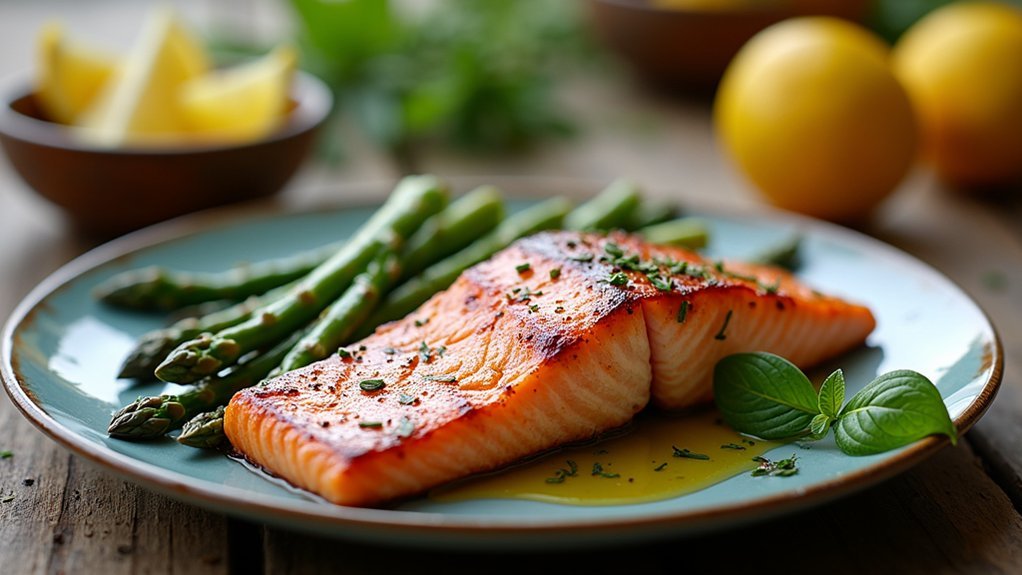
When senior strength athletes reach for their next meal, fatty fish should be a top consideration. Salmon, mackerel, sardines, and trout deliver EPA and DHA omega-3s that greatly reduce delayed onset muscle soreness (DOMS) and decrease inflammatory markers after workouts.
You’ll recover faster when consuming these fatty fish twice weekly because they optimize your muscle protein synthesis while minimizing breakdown during calorie restriction. The omega-3s act as natural vasodilators, improving oxygen delivery to working muscles and enhancing endurance by lowering your heart rate during activity. For athletes who prefer plant sources, adequate ALA intake from flaxseeds and chia seeds can provide alternative omega-3 benefits.
Beyond muscles, these healthy fats sharpen neuromuscular connections for better coordination and reaction time. They’re particularly valuable when you’re balancing your omega-6 to omega-3 ratio, creating an internal environment that controls inflammation and supports joint mobility after training.
Extra Virgin Olive Oil: The Foundational Fat for Senior Athletes
Extra virgin olive oil’s powerful anti-inflammatory compounds make it essential for senior athletes looking to reduce post-workout pain and accelerate recovery.
You’ll get maximum benefits by drizzling it on finished dishes rather than using high-heat cooking methods that can degrade its beneficial properties. The rich content of Omega 3 fatty acids helps support muscle maintenance and recovery, particularly important for senior athletes experiencing physical wear and tear.
For best results, aim for 2-3 tablespoons daily, incorporated into meals like salads, vegetables, or protein dishes.
Anti-Inflammatory Powerhouse Benefits
Although many fats have earned bad reputations, extra virgin olive oil stands as nature’s anti-inflammatory champion for senior strength athletes. The polyphenols in EVOO—particularly oleocanthal—provide ibuprofen-like effects without the side effects, reducing post-exercise inflammation and accelerating your recovery time.
- Oleocanthal mimics NSAIDs, targeting inflammatory markers that cause muscle soreness after intense workouts.
- Regular consumption reduces chronic inflammation in joints, essential for maintaining mobility and preventing pain.
- Anti-inflammatory properties work synergistically with antioxidants to protect muscle tissue during recovery.
Incorporating 2-3 tablespoons of EVOO daily delivers optimal dosage benefits for managing inflammation in your training routine.
You’ll notice decreased muscle soreness, improved joint function, and enhanced training consistency when you incorporate EVOO into your daily nutrition.
This natural anti-inflammatory approach allows you to train more effectively while supporting your long-term joint health.
Cooking Methods Matter
How you handle your olive oil in the kitchen directly impacts its anti-inflammatory superpowers. Extra virgin olive oil shines at moderate temperatures up to 375°F, making it perfect for sautéing and roasting but less suitable for high-heat frying.
To preserve EVOO’s heart-healthy benefits, opt for gentle cooking techniques. Try light sautéing of vegetables, roasting at medium temperatures, or braising with a splash of oil. These methods maintain those valuable monounsaturated fats and antioxidants your aging muscles need for recovery. Steaming with a drizzle of olive oil added after cooking is also excellent as it retains nutrients while minimizing oxidation of the oil.
For maximum nutritional impact, drizzle fresh EVOO over finished dishes rather than subjecting it to prolonged heat. This simple technique guarantees you’ll absorb more fat-soluble vitamins from your meals while keeping inflammation at bay—critical for your joint health and athletic longevity.
Daily Dosage Guidelines
Three factors determine your ideal olive oil intake as a senior strength athlete. While most experts recommend 1-2 tablespoons daily for general health, your athletic demands may benefit from 2-3 tablespoons to support recovery and performance. Each tablespoon provides about 120 calories of nutritionally dense energy through easily digestible monounsaturated fats.
- Activity Level: Adjust your intake based on training intensity and frequency—higher activity requires more anti-inflammatory support.
- Recovery Needs: Increase consumption slightly on heavy training days to maximize muscle recovery benefits.
- Overall Diet: Consider your total fat intake from all sources to maintain proper nutritional balance.
For best absorption, spread your olive oil consumption throughout the day rather than consuming it all at once. The oleocanthal compounds in extra virgin olive oil provide natural anti-inflammatory benefits similar to ibuprofen, making it particularly valuable for seniors managing joint discomfort during training.
Avocados: Nature’s Perfect Combination of Fats and Nutrients
When it comes to nutritional powerhouses for senior strength athletes, avocados stand out as one of nature’s most complete foods.
With 75% of their fat content being monounsaturated, they’re ideal for reducing inflammation and supporting healthy cholesterol levels.
You’ll benefit from avocados’ unique protein content—up to 4 grams per fruit, the highest among fruits.
The potassium they contain is essential for muscle function and preventing cramps during your training sessions.
For recovery, avocados deliver essential B-vitamins and folic acid that help with protein absorption and hormone regulation.
Their fiber content keeps you feeling full and helps manage weight—particularly important as you age.
Include avocados as pre- or post-workout snacks, but consume them moderately due to their calorie density. Avocados promote faster muscle recovery due to their abundance of antioxidant compounds that reduce oxidative stress after strength training.
Whole Eggs: Complete Nutrition for Muscle Preservation
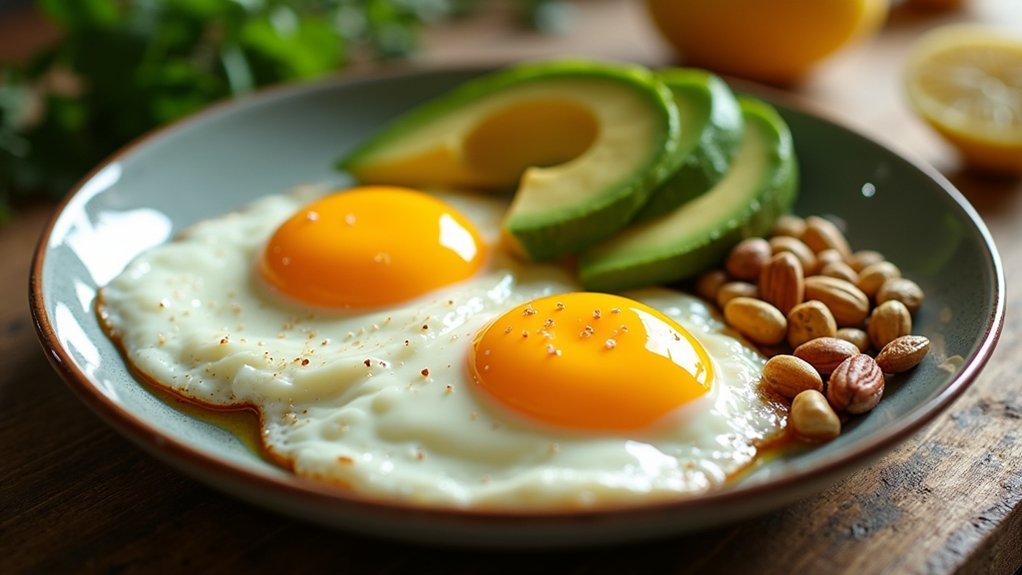
Powerhouses for aging muscles, whole eggs provide senior strength athletes with more than just high-quality protein.
Research shows consuming whole eggs post-workout enhances muscle protein synthesis by approximately 40% compared to egg whites alone. This superior response stems from the yolk’s complete nutrient matrix—vitamins A, D, E, and K, plus essential fatty acids—working synergistically with the protein. A study from the University of Illinois tracked amino acids using isotope labeling to confirm this significant difference in muscle-building potential.
- Bioactive compounds in yolks specifically support skeletal muscle accretion and maintenance in aging bodies
- Whole eggs’ natural nutrient complex improves protein utilization beyond what isolated protein sources can offer
- The integrated nutrient profile helps modulate inflammation and reduce oxidative stress, key factors in preserving muscle mass
Don’t discard those yolks—they’re vital for maximizing the muscle-preserving benefits you need.
Nuts and Seeds: Portable Powerhouses for Strength and Endurance
You’ll find omega-rich nuts and seeds provide portable protein packages that support your aging muscles while controlling inflammation from intense training.
Their healthy fats work as natural anti-inflammatories, helping your joints recover between workouts while delivering sustained energy for longer sessions.
Keep a small container of mixed walnuts, almonds, and chia seeds in your gym bag for a convenient post-workout snack that fights oxidative stress and supports your strength goals. The recommended one ounce daily serving provides sufficient nutrients without excess calories, helping senior athletes maintain optimal body composition.
Omega-Rich Protein Boosters
For senior strength athletes seeking convenient nutrition, nuts and seeds deliver an impressive combination of protein and omega-3 fatty acids in portable packages.
Hemp seeds lead the pack with 9 grams of protein per 3 tablespoons, while pumpkin seeds offer 8 grams per ounce plus magnesium that improves recovery-enhancing sleep.
You’ll find these omega-rich options particularly valuable for reducing inflammation and supporting muscle repair. The essential amino acid profiles in nuts and seeds—especially raw peanuts, pistachios, and hemp seeds—provide the building blocks your muscles need for maintenance and growth. Regular consumption of walnuts, which contain 4 grams of protein per ounce, can help senior athletes maintain lower cholesterol levels and support cardiovascular health during intense training.
- Hemp seeds deliver both high protein (9g/30g) and anti-inflammatory omega-3s
- Pumpkin seeds contain 8g protein per ounce plus recovery-supporting magnesium
- Brazil nuts provide methionine for antioxidant defense while pecans offer 186mg of omega-3 ALA per serving
Convenient Inflammation Fighters
While inflammation naturally occurs in response to intense training, the right portable snacks can provide powerful relief for senior strength athletes. Nuts and seeds deliver potent anti-inflammatory compounds in convenient, shelf-stable packages. These foods help manage cortisol levels released during strenuous workouts.
| Nut/Seed | Key Benefits |
|---|---|
| Walnuts | Omega-3s reduce exercise-induced inflammation |
| Almonds | Vitamin E and protein support muscle strength |
| Flaxseeds | Lignans and omega-3s improve gut health |
| Chia seeds | Fiber and antioxidants enhance recovery |
| Sunflower seeds | Vitamin E protects cells during intense workouts |
You’ll appreciate how easily these powerhouses fit into your training routine. Their long shelf-life makes them ideal for travel, while their portion-controlled nature supports consistent intake. Mix varieties for tailored anti-inflammatory benefits that’ll enhance blood flow, decrease soreness, and protect muscle tissue during your strength journey.
Grass-Fed Butter: Strategic Saturated Fats for Hormone Support
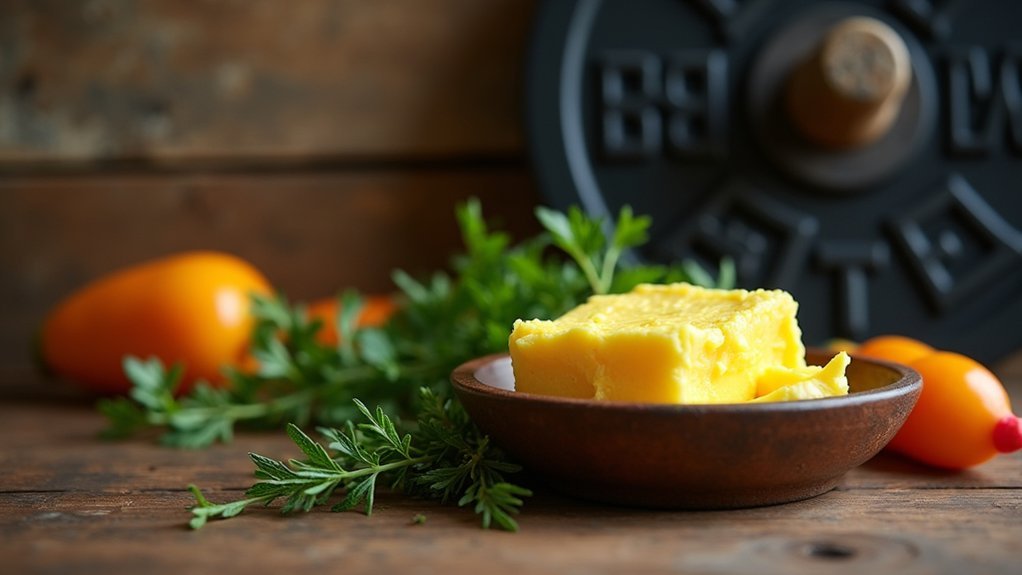
As older strength athletes increasingly recognize the critical role of dietary fats in hormone production, grass-fed butter has emerged as a powerful nutritional ally.
Unlike conventional butter, this nutrient-dense option contains a more favorable omega-3 to omega-6 ratio, supporting both cardiovascular health and reduced inflammation—crucial for recovery after intense training sessions. Additionally, grass-fed butter provides approximately 26% more omega-3 fatty acids than regular butter.
- Rich in vitamin K2 and CLA, grass-fed butter helps maintain bone density and immune function, two common concerns for athletes over 50.
- Contains MCTs that support efficient energy conversion, potentially enhancing workout performance and metabolic function.
- Provides saturated fats that serve as precursors for testosterone production, helping counteract age-related hormonal decline.
You’ll find this deep yellow butter not only enhances flavor but strategically supports your athletic longevity.
Full-Fat Greek Yogurt: Balancing Protein and Healthy Fats
Senior strength athletes seeking the perfect nutritional balance should consider full-fat Greek yogurt as a cornerstone food in their dietary arsenal. With 8-9g of fat and 9g of protein per serving, it delivers dual benefits for muscle maintenance and hormone production.
Full-fat Greek yogurt provides senior athletes the essential balance of fats and proteins needed for optimal strength and recovery.
The fat content aids absorption of vitamins A and D while providing CLA, which supports improved body composition. You’ll benefit from both fast-acting whey and slow-digesting casein proteins that sustain muscle nourishment throughout the day. While being Atkins friendly, this choice offers exceptional flexibility for those maintaining a lower-carb approach to strength training nutrition.
Beyond macronutrients, full-fat Greek yogurt delivers calcium and phosphorus for bone density—crucial for preventing fractures as you age. The potassium, B vitamins, and antioxidants support energy metabolism and recovery from intense training sessions.
Its satiating combination of protein and fat helps maintain lean muscle mass while supporting stable blood sugar levels.
Dark Chocolate: Antioxidant-Rich Fat Source for Recovery
Dark chocolate’s unique polyphenols won’t just aid your post-workout recovery through antioxidant activity, but they’ll also boost your mood with natural compounds that trigger endorphin release.
You’ll experience improved training consistency as dark chocolate’s theobromine and flavonoids enhance mood regulation and mental stamina during challenging workout periods. Aim for varieties with at least 70% cacao to maximize these benefits while minimizing sugar intake.
The cocoa-rich treat can also help lower your cortisol levels, potentially reducing exercise-induced stress responses that commonly affect senior athletes’ recovery times.
Performance Recovery Benefits
Elite strength athletes seeking nutritional advantages should consider dark chocolate as a powerful recovery aid. Research shows that consuming dark chocolate with at least 70% cocoa solids can reduce muscle damage markers and speed up recovery times. The flavonoids improve blood flow, delivering oxygen more efficiently to taxed muscles while reducing exercise-induced inflammation. Dark chocolate’s high cocoa content makes it more satisfying in smaller portions, helping senior athletes control calorie intake while still receiving recovery benefits.
- Reduced Muscle Soreness – Dark chocolate’s anti-inflammatory properties help minimize post-workout soreness, allowing you to train more consistently.
- Enhanced Blood Flow – Nitric oxide production increases, delivering more oxygen and nutrients to recovering muscle tissue.
- Oxidative Stress Protection – Potent antioxidants combat free radicals produced during intense training, protecting muscle cells from damage.
For senior athletes specifically, these recovery benefits can help maintain training frequency despite age-related slower recovery times.
Mood-Enhancing Training Support
Beyond physical recovery, the neural benefits of dark chocolate offer a compelling advantage for senior strength athletes. Dark chocolate triggers endorphin release and may influence serotonin levels, helping stabilize your mood during intense training periods. The high flavanol content in quality dark chocolate improves blood flow to the brain, supporting cognitive function in aging athletes.
| Mood Benefit | Mechanism | Training Impact |
|---|---|---|
| Stress Relief | Pleasurable taste triggers relaxation | Better recovery between sessions |
| Mental Clarity | Improved blood flow to brain | Enhanced focus during lifts |
| Positive Outlook | Endorphin and serotonin regulation | Consistent motivation |
You’ll find dark chocolate especially beneficial during challenging training phases when mental fatigue sets in. Its antioxidants reduce oxidative stress linked to mood disorders while supporting cognitive function through flavanols’ neuroprotective effects. Consider incorporating a small square of 70%+ dark chocolate into your post-workout routine for both physical and psychological recovery benefits.
Cortisol-Lowering Properties
While many athletes focus solely on protein intake, the cortisol-lowering properties of dark chocolate offer significant recovery advantages for senior strength athletes.
Though research directly linking dark chocolate to cortisol reduction remains limited, its flavanol content may help stabilize mood and reduce stress levels after intense training sessions.
Choose dark chocolate with at least 70% cocoa content to maximize benefits while minimizing sugar intake. For safety, consider checking Consumer Reports for options with lower levels of heavy metals like cadmium and lead.
The antioxidant-rich profile supports your recovery by:
- Potentially reducing stress hormone levels through flavanol activity
- Improving insulin sensitivity, which indirectly affects your body’s stress response
- Supporting overall emotional stability during challenging training periods
This makes high-quality dark chocolate a strategic addition to your nutrition plan, especially following workouts when your body needs both recovery support and a psychological boost.
Nut Butters: Versatile Fat Options for Strength Training Support
As mature athletes aim to maintain strength and muscle mass, nut butters emerge as exceptional allies in the training nutrition arsenal.
These nutrient powerhouses deliver proteins essential for repair with each serving providing 5-8 grams to support your recovery needs.
Packed with 5-8 grams of repair-focused protein per serving, nut butters deliver precisely what your muscles need for optimal recovery.
You’ll benefit from nut butters’ rich profile of potassium (189mg per serving in peanut butter) and magnesium that combat post-workout muscle cramps while reducing inflammation.
Their healthy fats support natural testosterone production—crucial for preserving strength as you age.
Incorporating peanut butter into your diet can help maintain stable blood sugar with its low glycemic index of 14, preventing energy crashes during extended training sessions.
Incorporate nut butters into your pre- and post-workout nutrition for improved recovery times and sustained energy.
Their portable nature makes them convenient for on-the-go nutrition, while their versatility allows easy addition to smoothies, toast, or even by the spoonful when you need quick nutritional support.
MCT Oil: Fast-Acting Energy for Aging Muscles
Medium-chain triglyceride (MCT) oil offers unique advantages for senior strength athletes seeking to combat age-related muscle decline. Unlike long-chain fats, your body rapidly absorbs and converts MCTs into ketones, providing quick energy for aging muscles without extensive digestion.
Research shows that supplementing with just 6g daily can increase muscle mass in older adults, potentially addressing sarcopenia concerns when combined with resistance training. MCT oil in combination with leucine and vitamin D has been shown to enhance muscle strength and function in frail elderly adults.
- Quick absorption: MCTs bypass liver processing, delivering immediate energy to working muscles
- Muscle preservation: Studies demonstrate improved muscle function and strength in elderly adults using MCT supplements
- Practical application: Start with 1 tablespoon daily in coffee or protein shakes, gradually increasing to 3 tablespoons for ideal benefits
Frequently Asked Questions
How Do Fat Requirements Change During Injury Recovery for Senior Athletes?
During injury recovery, you’ll need more anti-inflammatory fats like omega-3s to reduce inflammation and support healing. You’ll also require balanced fat intake that provides energy for recovery without causing weight gain during reduced activity.
Should Fat Intake Differ Between Training Days and Rest Days?
Your fat intake should remain relatively stable between training and rest days, though you’ll need fewer total calories on rest days. Focus on maintaining anti-inflammatory omega-3s daily to support recovery regardless of training status.
Can Certain Fats Help Prevent Age-Related Muscle Wasting?
Yes, certain fats can help prevent age-related muscle wasting. You’ll benefit most from omega-3s in fatty fish, monounsaturated fats in olive oil and avocados, and fat-soluble vitamin D that supports muscle repair mechanisms.
Are Plant-Based Omega-3s Equally Effective for Senior Athletes?
No, plant-based omega-3s (ALA) aren’t as effective as animal-based EPA and DHA for senior athletes. You’ll need higher doses due to poor conversion efficiency, making fish oil generally superior for muscle recovery and inflammation reduction.
How Do Medication Interactions Affect Fat Absorption in Older Athletes?
Medications you’re taking can reduce fat absorption due to slowed gastric emptying, altered bile production, and enzyme changes. This affects fat-soluble vitamins critical for recovery and may require adjusting your supplement timing around medications.
In Summary
You’ve got powerful options to fuel your strength training journey as a senior athlete. By incorporating these healthy fats strategically, you’ll support muscle maintenance, reduce inflammation, and boost energy levels. Remember, it’s not about avoiding fat—it’s about choosing the right kinds. Make these nutritional powerhouses part of your daily regimen, and you’ll continue building strength well into your golden years.

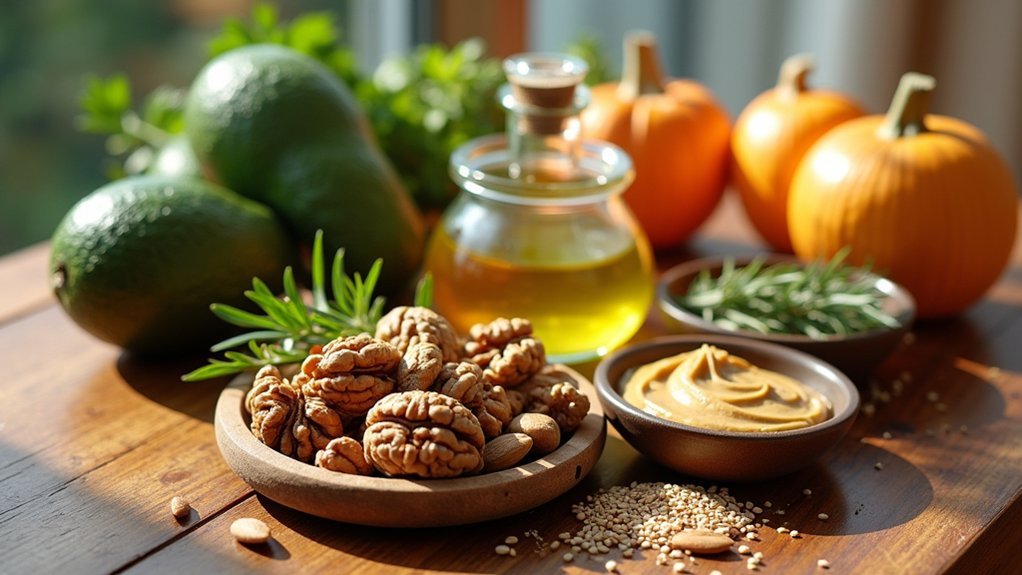

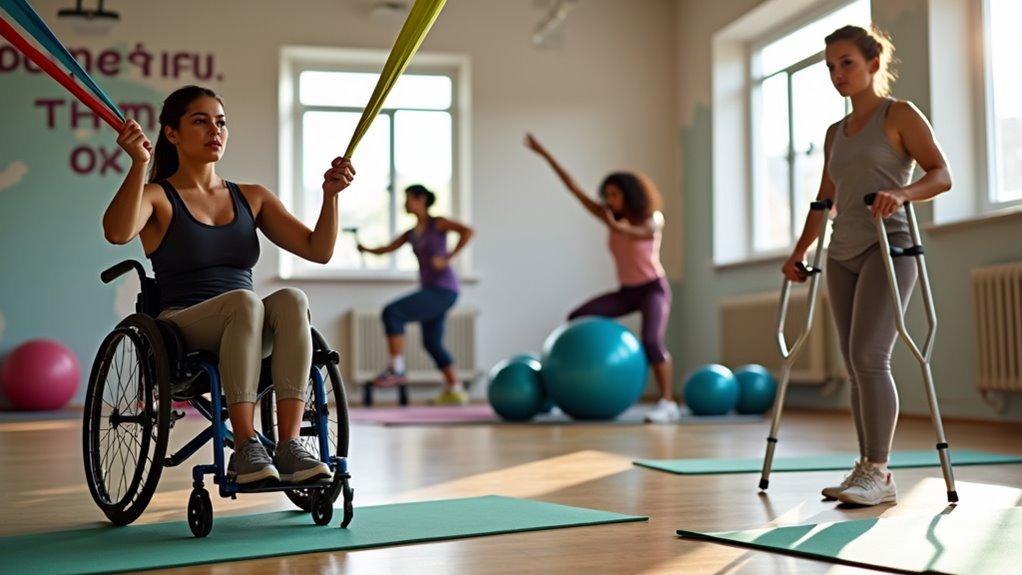
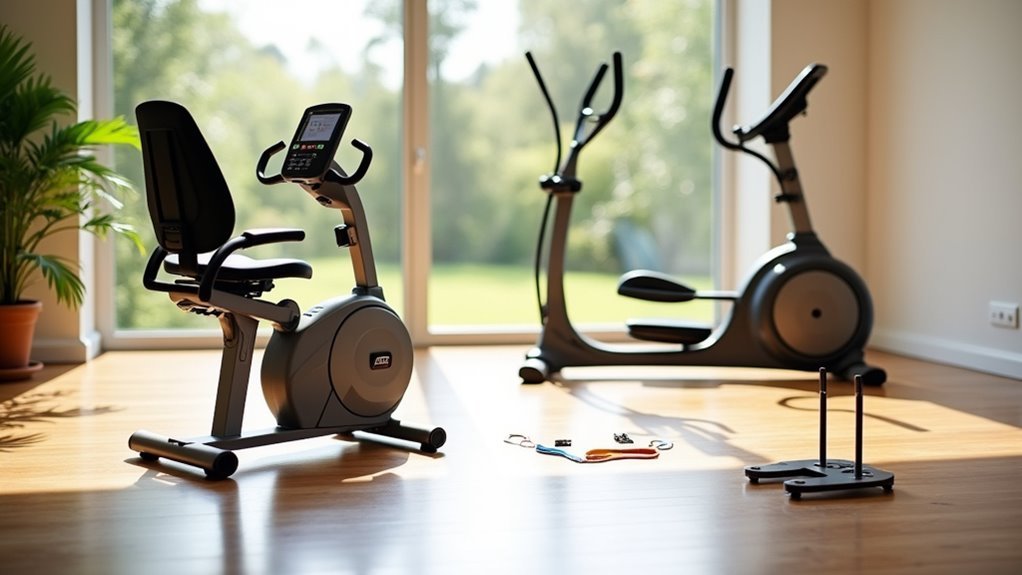
Leave a Reply